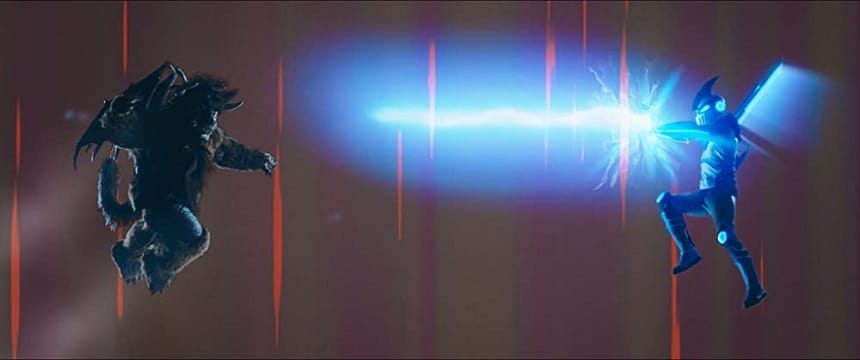Read also:
How to Watch FX Live Without CableHow To Watch AMC Without CableHow to Watch ABC Without CableHow to Watch Paramount Network Without CableEric McEver’s scrappy ode to tokusatsu and kaiju pictures wears its heart on its magically-armored sleeve.
I’m a proud member of the Power Rangers Generation, growing up in that perfect ’90s-kids age where the teenagers with attitude absolutely dominated our TVs and playgrounds for a solid half a decade. I’ve got a great deal of nostalgia for the series (right down to revisiting — and catching up with — the still-running TV show into my adulthood), with its goofily sincere messages and plots right alongside silly, well-choreographed fights between dudes in spandex and furry costumes.
It’s an interest I suspect I share with Eric McEver, the co-writer and director of Iké Boys, which played this year’s Fantastic Fest a few scant weeks ago. It’s got old-school Power Rangers/Super Sentai written all over it, and its deep well of affection for its inspirations is more than enough to smooth over some rough spots.
We open in 1972, where an acclaimed Japanese filmmaker convinces the studio to let him make Go! Great Decisive Battle at the End of the Century with Rainbows, an out-there kaiju picture that he thinks will serve as prophecy for the end of the world. Cut to decades later, and the film is apocrypha, the myths of Internet weebs the world over who are clamoring for a lost copy.

But one falls into the hands of two Oklahoma otaku: dorky Shawn Gunderson (Quinn Lord) and best friend Vik Kapoor (Ronak Gandhi), who watch it one day with recent Japanese exchange student Miki Shimizu (Christina Higa). All three of them fetishize cultures that are not their own: Shawn and Vik drool over Japanese anime and nerd culture, while Miki (in a move whose implications aren’t satisfactorily explored) obsesses over Native American iconography, which fueled her decision to come to Oklahoma.
But long story short, the tape zaps them with mysterious energy, and suddenly they’re left with slowly-growing powers they can’t control — and in some cases hide, as Shawn begins to grow Ultraman-like armor and Vik gains the strength and thick fur coat of a kaiju. And just in time, too, since certain prophecies are coming to pass, and the three soon find themselves on the run from moon-obsessed cultists who want to bring about the end of the world.
Luckily in McEver’s case, these changes aren’t just in service to Iké Boys‘ loving ode to Japanese anime and tokusatsu; they serve as nifty metaphor for the challenges of adolescence, especially when you’re an outsider among outsiders. As their powers grow, so too do they grow apart; Shawn finds newfound purpose in these abilities, while Vik’s resentment and desire for acceptance by their peers leads him to try to ditch the nerd and fit in with the cool kids. It’s slight, and more than a little predictable, but buoyed by charming performances from the leads (Gandhi, in particular, makes the most of some less-than-stellar dialogue) and the aw-shucks earnestness of the whole thing. It also leads to adorable real-world applications to sentai powers; haven’t you ever wanted to use an Ultra Beam to cook a Thanksgiving turkey in seconds flat?
Its deep well of affection for its inspirations is more than enough to smooth over some rough spots.
It’s also a thread endearingly represented in the dueling father figures in Shawn’s life: his redneck dad, played with incredible, bumbling charm by Farscape‘s Ben Browder (one of my favorite actors, bar none), and his blustering sensei (Billy Zane, wonderfully laconic in a gi and cowboy hat). The former loves his son, but isn’t used to all this Japanese stuff and doesn’t know how to handle it; the latter entertains and shares his passions, but has more egotistical motives. That neither of them truly end up villains at the end is a testament to the warmheartedness at the center of McEver and Jeff Hammer’s script, which (like the mightiest Final Move) can overcome any number of flaws. (Chief among those is Miku, who never really feels like a third part of the triumvirate like she should, and whose mixup of Indians and Native Americans leads to some pretty creaky jokes.)
That extends to the effects, as well, Iké Boys embracing its lean budget to turn its shoestring nature into a feature rather than a bug. The mecha and kaiju suits are admirably made for the resources McEver likely had available, and their simplicity ends up quaint rather than chintzy. When the action is meant to get hot and heavy, animated sequences take over, allowing them to achieve a scope that otherwise would be out of their reach. It’s a clear cost-cutting measure, but McEver simply shrugs and asks us to go along with it; I honestly admire the chutzpah, and that’s what makes it ultimately work.
Not only that, Iké Boys‘ winking silliness, without ever stretching into over-the-top self-awareness, is what makes its curious gumbo of ingredients work more than it doesn’t. Yes, it’s a goofy flick about a metal man fighting a hairy beast for the fate of the world. But underneath the unconvincing makeup is a story about fitting in, and the need to embrace your inner dork. For anyone whose brain contains far too much Power Rangers trivia, it’s a powerful lesson to impart, especially in such a sprightly package as this.